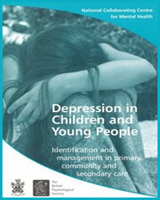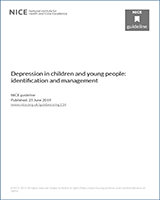All rights reserved. No part of this book may be reprinted or reproduced or utilised in any form or by any electronic, mechanical, or other means, now known or hereafter invented, including photocopying and recording, or in any information storage or retrieval system, without permission in writing from the publishers. Enquiries in this regard should be directed to the British Psychological Society.
NCBI Bookshelf. A service of the National Library of Medicine, National Institutes of Health.
National Collaborating Centre for Mental Health (UK). Depression in Children and Young People: Identification and Management in Primary, Community and Secondary Care. Leicester (UK): British Psychological Society (UK); 2005. (NICE Clinical Guidelines, No. 28.)
In June 2019 NICE updated the recommendations on psychological therapy in this guideline and in March 2015 NICE updated the recommendations on combination therapy. Most of the 2005 recommendations have been retained in NICE guideline NG134 depression in children and young people. The 2005 full guideline includes the evidence supporting those 2005 recommendations. Areas redacted in the PDF of this 2005 full guideline indicate areas that have been replaced by the 2015 or 2019 updates

Depression in Children and Young People: Identification and Management in Primary, Community and Secondary Care.
Show detailsFluoxetine vs. placebo - Non-remission
Fluoxetine vs. placebo - Non-response to treatment
Fluxetine vs. placebo - Depressive symptoms
Fluxetine vs. placebo - Functional status
Fluxetine vs. placebo - Global improvement
Fluxetine vs. placebo - Severity of illness
Fluxetine vs. placebo - Adverse events
Fluoxetine vs. placebo - Discontinuation from treatment
Fluoxetine vs. placebo - Suicidality (FDA re-analysis)
Paroxetine vs. placebo - Non-remission
Paroxetine vs. placebo - Depressive symptoms
Paroxetine vs. placebo - Non-response to treatment
Paroxetine vs. placebo - Functional status
Paroxetine vs. placebo - Global improvement
Paroxetine vs. placebo - Adverse events
Paroxetine vs. placebo - Discontinuation from treatment
Paroxetine vs. placebo - Individual adverse events
Paroxetine vs. placebo - Suicidality (FDA re-analysis)
Sertaline vs. placebo - Non-remission
Sertaline vs. placebo - Non-response to treatment
Sertaline vs. placebo - Depressive symptoms
Sertaline vs. placebo - Functional status
Sertaline vs. placebo - Suicidality (FDA re-analysis)
Sertaline vs. placebo - Global improvement
Sertaline vs. placebo - Severity of illness
Sertaline vs. placebo - Adverse events
Sertaline vs. placebo - Discontinuation from treatment
Citalopram vs. placebo - Non-remission
Citalopram vs. placebo - Suicidality (FDA re-analysis)
Venlafaxine vs. placebo - Depressive symptoms
Venlafaxine vs. placebo - CDRS-R
Venlafaxine vs. placebo - Discontinuation due to adverse events
Venlafaxine vs. placebo - Suicidality (FDA re-analysis)
Mirtazapine vs. placebo - Depressive symptoms
Mirtazapine vs. placebo - Discontinuation due to adverse events
Mirtazapine vs. placebo - Suicidality (FDA re-analysis)
Nefazodone vs. placebo - Suicidality (FDA re-analysis)
SSRIs vs. placebo - Serious adverse events
SSRIs vs. placebo - "Outcome 3: definitive suicidal behaviour/ideation" (FDA re-analysis)
SSRIs vs. placebo - Discontinuation due to adverse events
SSRIs vs. placebo - Discontinuation from treatment
SSRIs vs. placebo - Treatment-emergent hostility or agitation (FDA re-analysis)
Fluoxetine + CBT vs. fluoxetine alone
- Antidepressant drug treatment – forest plots - Depression in Children and Young ...Antidepressant drug treatment – forest plots - Depression in Children and Young People
- Stakeholders who responded to early requests for evidence - Depression in Childr...Stakeholders who responded to early requests for evidence - Depression in Children and Young People
- Stakeholders and experts who responded to the first consultation draft of the gu...Stakeholders and experts who responded to the first consultation draft of the guideline - Depression in Children and Young People
Your browsing activity is empty.
Activity recording is turned off.
See more...
